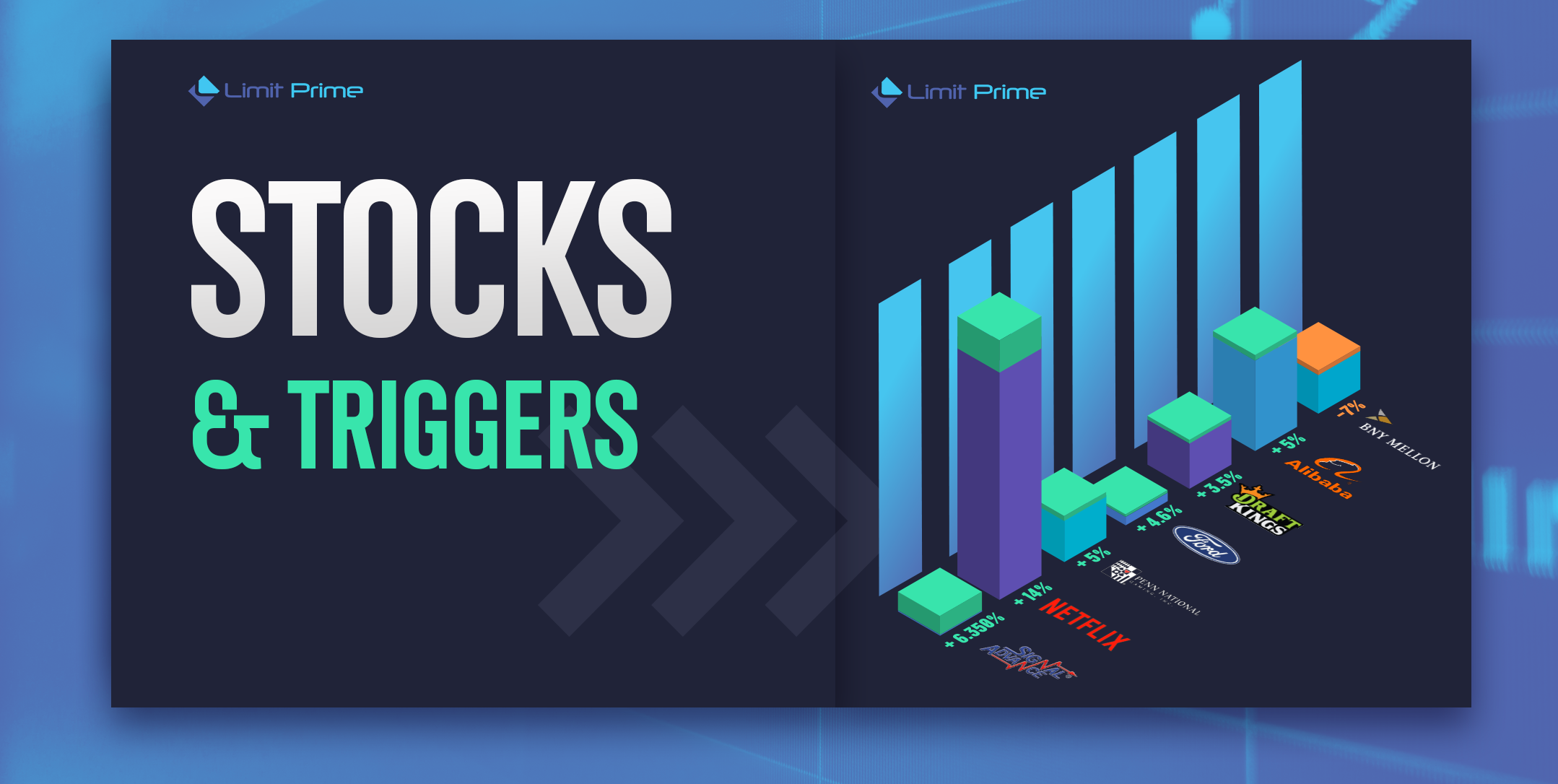Stocks & Triggers
29.03.2021

There are a number of reasons why stock prices can increase and decrease. Sometimes we can talk about triggers that permanently affect the value of stocks, while in other cases the changes can be short-termed caused by media misinformation as well as misinterpretations of signals in the financial market.
There are examples where only one tweet or misinterpreted statement by an official has caused confusion in the market. Certainly, stock prices are also affected by really big events on a global level, such as the current Covid-19 pandemic.
Check below several companies and the triggers that have lately, led to a change in the prices of their stocks.
Penn National Gaming, an American operator of casinos and racetracks, received impressive coverage from Credit Suisse with an outstanding rating. This event triggered investors to buy, rising its stocks up to 5%.
Ford Motor stocks spiked 4.6% after Deutsche Bank added a short-term buy idea on the stock. The bank said it’s bullish on the company’s upcoming earnings report in February.
DraftKings stocks of the sports-betting company increased 3.5% after Morgan Stanley upgraded the stock from equal weight to overweight. This company is expected to increase its revenue by 10%.
Alibaba stocks jumped more than 5% after its founder Jack Ma made his first public appearance in several months, after media silence due to critical comments on China’s financial regulators in October.
Shares of Signal Advance skyrocketed after the Tesla CEO tweeted “Use Signal” early in January. Musk meant Signal, the encrypted messaging service and app. Prior to it though, shares of Signal Advance hadn’t climbed above 60 cents.
Due almost entirely to the investor’s signals being misinterpreted, the stock closed at $7.19 on January 8. Momentum accelerated even further on January 11, pushing the closing price to $38.70, an increase of 6350% over three trading sessions.
Bank of New York Mellon stocks slid near to 7%. BNY Mellon reported adjusted earnings per share of $0.96 on $3.84 billion of revenue and analysts had expected $0.91 per share on $3.83 billion revenue. A reduced net interest margin was negative in the report.
There are examples where only one tweet or misinterpreted statement by an official has caused confusion in the market. Certainly, stock prices are also affected by really big events on a global level, such as the current Covid-19 pandemic.
Check below several companies and the triggers that have lately, led to a change in the prices of their stocks.
How Do Triggers Affect the Stocks?
The ongoing Covid-19 pandemic and the onset of a new virus strain prompted viewers to buy Netflix’s services once more fearing another year of lockdown, with numbers reaching 200 million, which in return skyrocketed stocks by 14%. This streaming company beat Wall Street’s revenue and subscribers’ expectations which made 2020 a pretty good year for Netflix.Penn National Gaming, an American operator of casinos and racetracks, received impressive coverage from Credit Suisse with an outstanding rating. This event triggered investors to buy, rising its stocks up to 5%.
Ford Motor stocks spiked 4.6% after Deutsche Bank added a short-term buy idea on the stock. The bank said it’s bullish on the company’s upcoming earnings report in February.
DraftKings stocks of the sports-betting company increased 3.5% after Morgan Stanley upgraded the stock from equal weight to overweight. This company is expected to increase its revenue by 10%.
Alibaba stocks jumped more than 5% after its founder Jack Ma made his first public appearance in several months, after media silence due to critical comments on China’s financial regulators in October.
Shares of Signal Advance skyrocketed after the Tesla CEO tweeted “Use Signal” early in January. Musk meant Signal, the encrypted messaging service and app. Prior to it though, shares of Signal Advance hadn’t climbed above 60 cents.
Due almost entirely to the investor’s signals being misinterpreted, the stock closed at $7.19 on January 8. Momentum accelerated even further on January 11, pushing the closing price to $38.70, an increase of 6350% over three trading sessions.
Bank of New York Mellon stocks slid near to 7%. BNY Mellon reported adjusted earnings per share of $0.96 on $3.84 billion of revenue and analysts had expected $0.91 per share on $3.83 billion revenue. A reduced net interest margin was negative in the report.
LimitPrime © 2026
Categories
Buy and sell stocks with ease.
Leave comment
Comments
READ MORE INTERESTING ARTICLES

In today's chip-making world, there's a new kid on the block: artificial intelligence (AI). Several companies are changing the...
Read More
What is Bitcoin Halving?Bitcoin halving day is eagerly anticipated by crypto enthusiasts and investors, and of course, it marks a cruci...
Read More
In the evolving world of cryptocurrency, where Bitcoin and Ethereum often take center stage, there isn't much focus on the other di...
Read More